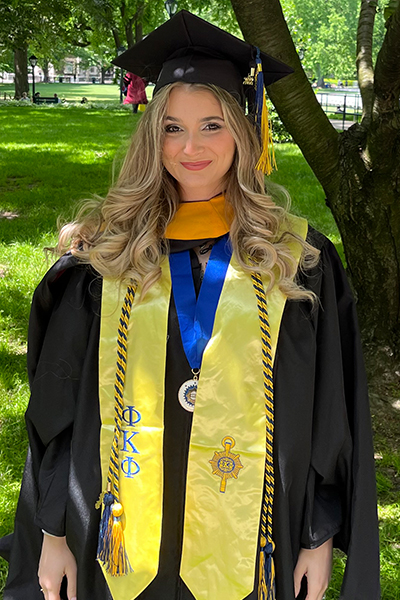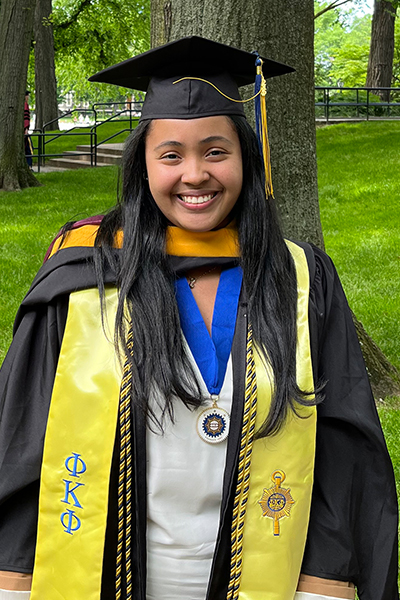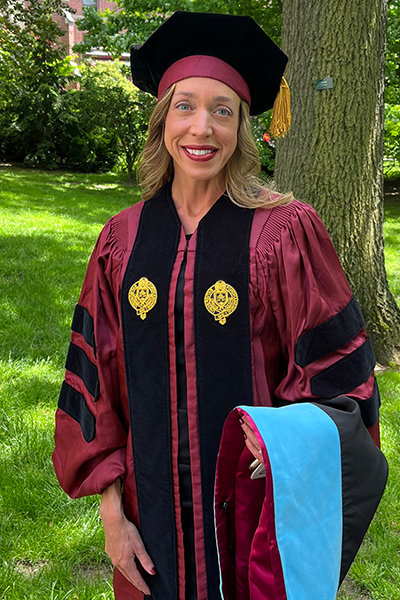“You persevered during the perfect storm” of the COVID-19 pandemic and a national reckoning with racial inequities, José Luis Alvarado, Ph.D., dean of the Graduate School of Education (GSE), told them during the May 23 ceremony on the University’s Rose Hill campus.

“The path you chose was tough, yet the skills you developed—resourcefulness, tenacity, resilience, and patience—will serve you well in your professional career. … As GSE alumni,” he added, “you are equipped with the tools to promote a just society and to advance educational and social equity.”
For Ever Ramirez, the sense of solidarity Alvarado described was palpable.
“All these people right here who I’m graduating with—they’re my people,” said Ramirez, who earned a master’s degree in school counseling. “I know everyone here is going to support me.”
Ramirez, who started as a part-time student in the program, will begin working as a counselor at Tompkins Square Middle School in Manhattan this fall. “It’s been four long years, and it’s not just [about]me. It’s the people who have been helping me through it: my parents, my fiancée. They’re honestly more excited than I am.”
A ‘Sympathetic and Caring’ Faculty

Several graduates noted how Fordham faculty members not only imparted their expertise in the classroom but also acted as mentors who provided space for making connections, even as classes shifted to meeting online.
“The professors were so sympathetic and caring about our days, so there was a lot of catching up on our weeks” during online sessions, said Coleen Clarke, an assistant teacher at an early childhood center in the Bronx who graduated from the curriculum and teaching master’s program. “I loved all of my professors, each and every one of them. I gained so much from all of them.”
For Teresa Garofalow, online classes were part of the plan from the outset. She graduated from the online master’s program in childhood special education, earning an M.S.T. and certification in both childhood education and teaching students with disabilities in childhood. But she said that faculty support was essential in making things go smoothly.
“I loved my adviser, Annie George-Puskar,” said Garofalow, who works at a private school that emphasizes applied behavior analysis. “She was really easy to get a hold of and talk to with any issue I had. She became my

adviser mid-program, which was honestly really helpful, because I felt I was a little lost. She was a huge help in getting me in the right direction.”
An Accelerated Path to the Classroom
The diploma ceremony marked the second Fordham graduation in three years for Jazmin Nazario.
Three years ago, as a Fordham junior, the Red Hook, Brooklyn, native enrolled in the Graduate School of Education’s accelerated master’s in teaching program. She had been serving as an AP calculus instructor in Fordham’s STEP program, and she knew she wanted to become a math teacher. Nazario began taking graduate courses while completing her bachelor’s degree at Fordham College at Lincoln Center in 2020. That same year, she joined the faculty at Icahn Charter School 6 in the Bronx, where she teaches math to seventh- and eighth-graders.

“What was nice about the accelerated program was Fordham was already familiar to me,” Nazario said, noting that she had the chance to work with her graduate adviser, Alesia Moldavan, Ph.D., as an undergraduate researcher. “It didn’t feel like I had to start over. I already had familiar faces, so it was like keeping it going instead of starting from scratch.”
Bridging a ‘Gap of Inequity’ in Mental Health Services
Ricardo Perez, who graduated from GSE’s bilingual school psychology advanced certificate program, said that one of his professors—Yi Ding, Ph.D.—became a familiar face as soon as he looked into attending Fordham.
“She was at my open house,” Perez said of Ding. “She was actually the person who sold me on Fordham. I credit her with my decision to go here. She’s also been a huge pillar of support. She recommended I apply for scholarships [that I got], so I’m in a great position because of her.”

Perez is currently interning at P.S. 142 Amalia Castro on Manhattan’s Lower East Side, and he is applying to full-time positions as a bilingual school psychologist for the fall. He said he was motivated to become a school psychologist because of his experiences with a younger brother with autism and because of his own childhood ADHD diagnosis. While completing childhood clinical psychology internships as an undergrad at NYU, he realized he wanted to work in a public school. Doing so would offer him a greater opportunity to serve children who have fewer resources, he said.
“The first point of mental health contact is schools, public schools specifically. I wanted to bridge that gap of inequity in mental health services.”
In the Service of Others
Better serving children—a goal at the heart of so much of the work being done by GSE students, faculty, and graduates—was the reason that Melissa Szymanski enrolled in the school’s doctoral program in educational leadership, administration, and policy.

“I consider myself the lead learner of my organization,” said Szymanski, an assistant superintendent for curriculum and instruction in Westchester County, New York. “So everything that I’ve done through this program is really in service to my own learning, in contribution to my organization, and in support of the children.”
That sense of service and dedication is what made Joseph M. McShane, president of Fordham, refer to the graduates as “brave oddities.”
“More precisely, you are saving and heroic oddities,” he said in his address to graduates. “You are not in a profession that you will spend your lives in for either money or glory. Rather, you are a reckless bunch who put the welfare of those in your care above your own. … I am jealous of the students whom you will teach.”
